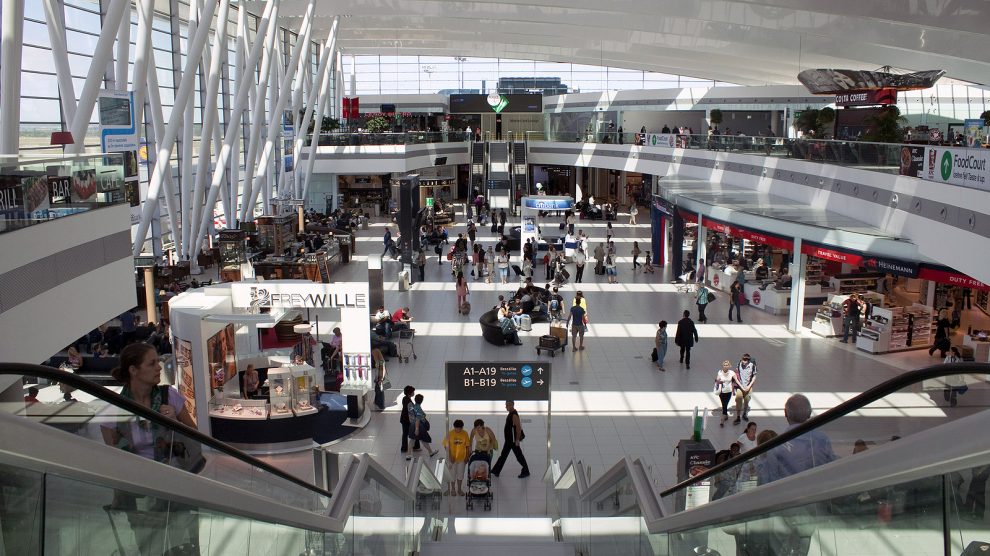Poland’s plans for a Solidarity Transport Hub, a ‘mega’ airport serving all of Central and Eastern Europe, face competition from Budapest Ferenc Liszt, now owned by an investment fund controlled by the Hungarian state.
While Polish Prime Minister Donald Tusk was last month announcing that the country’s plans for a new airport, the much-touted Solidarity Transport Hub, were to be scaled back, Hungary was quietly announcing plans of its own to build a third terminal in order to boost capacity at Ferenc Liszt Airport in Budapest, the country’s only airport of any real size.
In June, Ferenc Liszt was returned to majority state ownership for the first time since 2005 when Corvinus, an investment fund owned and managed by the Hungarian state, took an 80 per cent stake in the airport, with French infrastructure giant Vinci Airports acquiring the remaining 20 per cent and becoming the airport’s operator.
- CEE can put itself at the heart of the global supply chain
- Poland’s streamlined Solidarity Hub promises ‘triple leap into modernity’
- Reimagining Central and Eastern Europe’s future development through the Three Seas Initiative
Together, Corvinus and Vinci paid 3.1 billion for Ferenc Liszt’s equity and took on debts of 1.2 billion euros from the previous owner, German airport management company AviAlliance, Canadian investment group CDPQ and Singaporean sovereign wealth fund GIC.
The purchase, said Hungarian Prime Minister Viktor Orbán, corrected an “unforgiveable mistake”, referring to the sale of the airport by Hungary’s then Socialist government in 2005.
Orbán has long sought to bring key pieces of Hungarian infrastructure, as well as strategic business sectors, under government control, bucking the trend of other countries in emerging Europe which have broadly sought to sell off remaining state assets. Hungary has instead taken over energy and utilities firms, part of the banking sector, and telecommunications.
At times, these takeovers have been hostile. “Foreign investors—the backbone of the Hungarian economy—face strong pressure to sell to Hungarian companies linked to those oligarchs,” noted BertelsmannStiftung in its latest, 2024, review of the Hungarian economy. “If they refuse, they are likely to face extraordinary tax authority scrutiny and audit measures.”
LOT’s opportunity
Budapest Ferenc Liszt Airport ended 2023 with a net profit of 74 million euros on revenues of 337.8 million euros—an increase of 20 per cent on 2022. The airport served almost 15 million passengers in 2023, and its new owners have their sights on far higher numbers in the coming years.
Economic Development Minister Márton Nagy said last month that passenger numbers would increase to 18 million by 2028 and almost 20 million by 2030. The construction of a third terminal, estimated to cost two billion euros, would allow the airport to serve 25 million passengers by 2040.
Warsaw’s Frederic Chopin Airport, in comparison, served 18.5 million passengers in 2023 and the (albeit optimistic) projections for the Solidarity Transport Hub are 40 million passengers by 2035.
Much of the thinking behind the Solidarity Transport Hub was the need to create a ‘mega’ airport that would serve all of Central and Eastern Europe, a hub that would end the necessity of the region’s travellers to change planes in Western Europe, or Istanbul, when flying long-haul.
However, since the demise of Malev in 2012, Hungary has lacked a national airline that could make Ferenc Liszt a hub for connecting flights. The largest airline at the airport, Hungary’s Wizz Air, is a point-to-point, low-cost carrier which does not sell connecting flights. And despite clearly eyeing for itself a role as a key transport hub for the region, Hungary’s government has so far showed little enthusiasm for creating a new national airline.
That could therefore (ironically, perhaps) offer LOT, Poland’s profit-making national airline (which would be an anchor for the Solidarity Transport Hub), an opportunity to fill the breach.
It already operates direct long-haul flights from Ferenc Liszt to Seoul, in South Korea, and might spot a chance to create a new hub in the Hungarian capital should Poland’s prevarication over the Solidarity Transport Hub (there is still no guarantee that the project will go ahead) continue.
Ready for take off
There’s little doubt that a ‘mega’ airport somewhere in Central and Eastern Europe would serve as a critical hub for international trade and tourism, enhancing the region’s connectivity with major global markets. It would support local economies, create jobs, and boost GDP, making it a vital asset for sustaining economic growth.
It could incorporate cutting-edge technology, sustainable practices, and efficient design to offer a superior travel experience.
Moreover, it would enhance cargo handling capabilities, supporting the region’s role in international trade and cementing its position as a dominant supply chain hub.
For some time, Poland’s Solidarity Transport Hub appeared to be in the prime position. Years of delays mean that Budapest might be about to take off far sooner.
Unlike many news and information platforms, Emerging Europe is free to read, and always will be. There is no paywall here. We are independent, not affiliated with nor representing any political party or business organisation. We want the very best for emerging Europe, nothing more, nothing less. Your support will help us continue to spread the word about this amazing region.
You can contribute here. Thank you.


